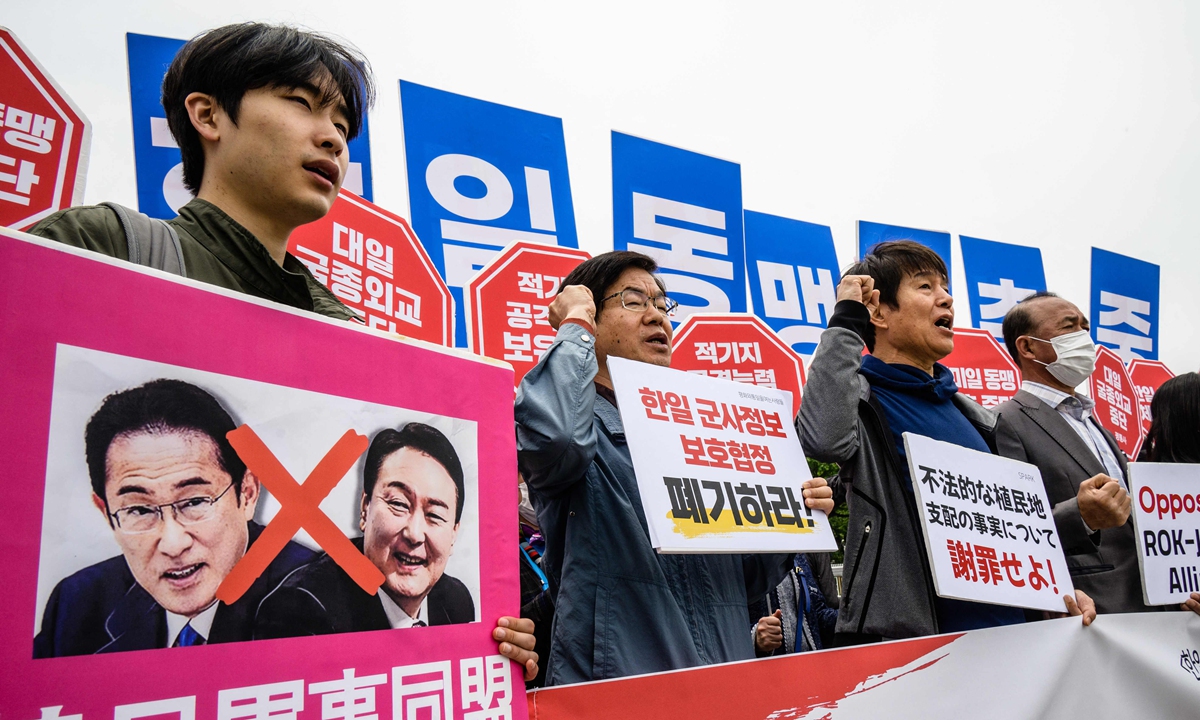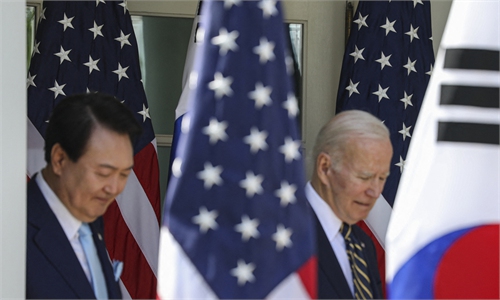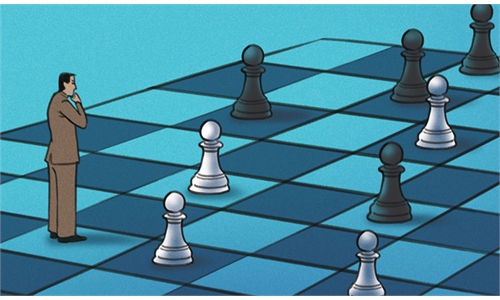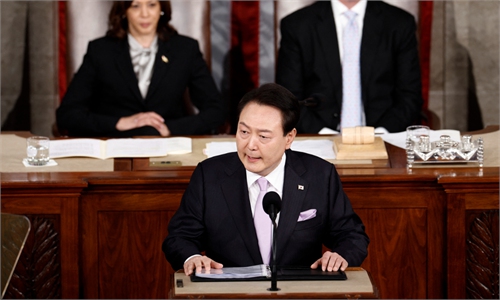Kishida's visit to S.Korea makes Tokyo, Seoul a pair of 'strange bedfellows'
Tokyo, Seoul should show sincerity for restoring China-Japan-S.Korea trilateral talks

Protesters stage a rally to oppose a visit by Japanese Prime Minister Fumio Kishida in front of the presidential office in Seoul, South Korea, on May 7, 2023. The leaders of South Korea and Japan met on the day for their second summit in less than two months, following a first in Tokyo in March. Photo: VCG
As the heads of South Korean and Japanese governments met on Sunday for their second summit in less than two months, Chinese analysts said this kind of frequent exchanges show that under US pressure, Tokyo is using the office term of a South Korean leader who is both extremely pro-US and pro-Japan as a "time window" to further push bloc confrontation in the region to serve US strategic needs of containing China.
Japanese Prime Minister Fumio Kishida arrived in South Korea and began talks with South Korean President Yoon Suk-yeol on Sunday. Kishida's two-day visit reciprocates Yoon's mid-March trip to Tokyo. It was the first exchange of visits in 12 years between the leaders of the two East Asian countries with complicated relations, according to media reports.
Kishida will invite Yoon as a guest to attend the Group of Seven summit to be held later this month in Japan, so if the South Korean leader visits Japan twice within a month and without a reply visit from the Japanese leader, that would be unusual and unbalanced for the bilateral ties, experts said. Tokyo is showing support to the Yoon administration for its overwhelming pro-US and pro-Japan policy, and Washington and Tokyo both know that as soon as Yoon loses power, they will lose the "time window" to tie South Korea with their hostile strategy against China, Russia and North Korea.
Fragile reconciliation
On the first day of his visit, Kishida immediately paid respects at the Seoul National Cemetery in Dongjak District, southern Seoul, where Korean nationals including independence fighters and veterans of the Korean War (1950-53) are commemorated. This marked the first such trip to the cemetery since Japanese Prime Minister Yoshihiko Noda last made a visit to Seoul in October 2011 to meet the then South Korean president Lee Myung-bak, South Korean media Joongang Daily reported.
Han Xiandong, an expert on Korean studies and a professor at China University of Political Science and Law, told the Global Times on Sunday that although paying a visit to the Seoul National Cemetery is sort of a routine schedule for most foreign leaders who visit the country, Kishida's visit is special.
"Yoon and Kishida both are the leaders of right-wing political parties of their respective countries and they share similar conservative ideology. And the Seoul National Cemetery is now becoming a symbol for right-wingers to publicize their anti-Communist or anti-Pyongyang stance," Han said.
The progressive parties in South Korea, which are now opposition parties, consider that the Republic of Korea (Provisional Government of the Republic of Korea) was founded in 1919 in Shanghai, China, and they had the tradition to fight Japan's invasion and colonization for the independence of Korean nation; but the conservative groups, including Yoon's party, consider that their country was founded in 1948, and they have obvious anti-Communist and pro-Japan tradition, Han noted.
"Therefore, Kishida's visit to this place is sending a signal - the current close ties between the two countries are based on the ideology shared by the two right-wing parties," Han noted. "In other words, Japan is only friendly to the pro-Japan right-wingers, not to all South Koreans."
This is also the reason why many observers believe that the current "reconciliation" between the two countries is fragile and unsustainable, and will change as soon as the Yoon administration and conservative camp lose power in South Korea.
According to China Global Television Network, representatives of several civic groups from South Korea held a candlelight rally on Saturday to protest against the upcoming visit of the Japanese prime minister. The protesters said that "Japan must face up to its history, sincerely apologize for the forced labor and comfort women and compensate the victims and their families."
South Korea's main opposition Democratic Party also criticized Yoon's visit to Japan in March as being "empty-handed." The Democratic Party and civic groups have taken part in massive rallies in Seoul protesting the upcoming Kishida-Yoon meeting as "shameful diplomacy," the Diplomat reported on Saturday.
Li Haidong, a professor at the China Foreign Affairs University, told the Global Times on Sunday that "the dramatic 'reconciliation' between Japan and South Korea is forced by the pressure from the US."
Apart from historical problems, Japan and South Korea also have a sovereignty dispute. According to media, Jeon Yong-gi, a lawmaker of the main opposition Democratic Party, on Tuesday traveled to islands that South Koreans refer to as the Dokdo islets, and which are called Takeshima by Japan. The islands are located halfway between the Korean Peninsula and Japan. The Japanese Foreign Ministry delivered a formal protest by phone to the South Korean embassy in Tokyo the same day.
US' pressure has neither solve historical problem nor sovereignty dispute between Japan and South Korea, and when Yoon finishes his term, the current progress in reconciliation risks being reversed, said analysts.
Although Tokyo and Seoul are seizing the current opportunity to push forward their cooperation, it's still too early to say the US has formed a trilateral alliance with South Korea and Japan, Liu Jiangyong, vice dean of the Institute of Modern International Relations at Tsinghua University, told the Global Times on Sunday.
Apart from historical problems and sovereignty disputes, giant companies of the the two East Asian countries are actually rivals in many fields globally, and they have very low mutual trusts, and when they cooperate with each other, they are also finding a way to compete with each other, so a close alliance between them is unlikely despite both being allies to the US, experts noted.
Li said, "they [Japan and South Korea] are more like a pair of strange bedfellows. They sleep on the same bed under the pressure or driven by some interests, but they will never sincerely cooperate, as they have structural contradictions."
Possible cooperation
At Kishida's summit with Yoon in Seoul, they are likely to agree on deepening security relations between Tokyo and Seoul to address "North Korea's missile and nuclear development," a Japanese government official said, as quoted by Japanese media Kyodo News on Sunday.
Liu said the US, Japan and South Korea are actually thinking about different topics when pushing cooperation with one another. The US and Japan want to use South Korea to not only contain North Korea, but also help them contain China and Russia, but Seoul want to use US and Japan's power to mainly target Pyongyang.
Kyodo also reported on Saturday that the leaders of Japan and South Korea will use their meeting as a chance to confirm the necessity and importance for restoring the China-Japan-South trilateral talks as soon as possible.
The trilateral talks among the three key economies of Asia were stopped due to the tensions between South Korea and Japan during the term of Yoon's predecessor Moon Jae-in; the COVID-19 pandemic also added new obstacles. South Korea is scheduled to be the host for the next round of the trilateral talks, media reported.
Han said that the US would be the biggest obstacle for the three East Asian countries to try to restore trilateral talks and promote regional integration, because Washington's act to push bloc confrontation in the region has seriously ruined the atmosphere for integration in this region.
Experts said both Japan and South Korea are recently being provocative to China, especially on the China's core interest, the Taiwan question, so before Tokyo and Seoul show clear attitude to correct or explain their provocative statements, or at least show sincerity before taking concrete actions, the trilateral talks would be hard to restore, said Chinese experts. This will be a test for Kishida and Yoon, as they need to find a way to be pragmatic and serve the interests of the business circle of their countries while also catering to the US' Indo-Pacific Strategy that aims at containing China, analysts said.




